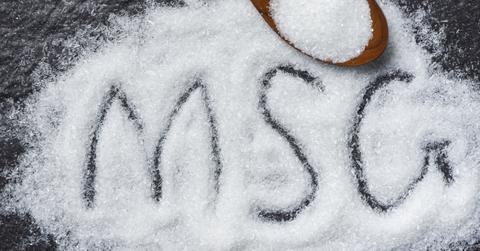We Owe MSG an Apology: A Food Scientist Tells Us How It's a Flavor-Enhancing Star (Exclusive)
"As awareness of its safety and benefits grows, chefs and home cooks will likely use [MSG] more to create richer, more savory dishes."
Published June 13 2024, 10:09 a.m. ET

After decades of fearmongering and pointed research, you surely once associated MSG, or monosodium glutamate, with nasties like Red Dye 40 and sodium benzoate, avoiding those three letters like the plague.
Unfortunately, MSG — a flavor enhancer known for giving savory dishes and processed foods an umami taste — essentially being blacklisted in the West is more related to "flawed science and xenophobia," as put by ABC News, than actual health concerns.
The 2016 piece by Anna Maria Barry-Jester mentioned negative Yelp reviews regularly panning Chinese restaurants for meals “laden with MSG” that supposedly caused "racing hearts, sleepless nights and tingling limbs." But were any of these claims based on fact? Or were they simply a result of baseless stigmas?
Whispers-turned-shouts about "Chinese restaurant syndrome" are hardly linked to scientific fact. In reality, MSG is on the U.S. FDA's “generally recognized as safe” (GRAS) list.

"Although many people identify themselves as sensitive to MSG, in studies with such individuals given MSG or a placebo, scientists have not been able to consistently trigger reactions," the FDA wrote in 2012. It's fair to say the way MSG was demonized by the public, the media, and even scientists was, well, tasteless.
While we, of course, aim to understand the truths and debunk the unfortunate myths connected to MSG, we also want to highlight its ability to accentuate flavor and ponder its place in the future of recipe development.
Green Matters spoke exclusively with Jessica Gavin — a certified food and culinary scientist and author of the Easy Culinary Science cookbook — about the flavor-enhancing magic of MSG.
What exactly is MSG and what does it taste like?
"MSG is the sodium salt of L-glutamic acid, an essential amino acid. Produced artificially, it appears as white, translucent granules or powder," Jessica Gavin exclusively tells us via email.
Discovered by Japanese chemist Kikunae Ikeda in 1907, said white powder was initially sold in "slender bottles meant to attract bourgeois housewives who were embracing science in the kitchen because it suggested hygiene and modernity," as per the 2016 ABC News piece, which cited the research of Georgetown University Japanese history professor Jordan Sand.
"MSG naturally occurs in many foods as part of the glutamic acid in proteins. It is especially high in protein-rich foods like eggs, cheese, fish, kombu, chicken, red meat, and tomatoes," Gavin continues.
What if we told you MSG tastes kind of weird on its own? ASMR and mukbang YouTuber BenDeen described a container of the once-taboo food additive as smelling faintly like "an empty bag of chips" and tasting "earthy," "sea-like," "tinny," "gamey," and "like liver."
See, MSG shines when it's used to amplify existing flavors.
"The USDA classifies it as a flavor enhancer, so it must be labeled on food products," Gavin explains. "MSG has a unique taste known as umami, often described as savory or meaty."
Umami is said to be one of five basic tastes our tastebuds can identify, the others being sweet, salty, sour, and bitter. According to a 2019 study published in Annals of Saudi Medicine, our umami receptor can detect all 20 ammo acids, but "it has the highest affinity for glutamate."
"MSG intensifies the savory notes in food, creating a richer and more complex taste. It adds value to a meal by improving palatability and reducing the need for excessive salt," Gavin continues. "MSG can enhance flavors in Asian stir-fries, Italian tomato sauces, American barbecue rubs, Thai curries, traditional beef stews, and hearty braises."
Bonnie’s, a Cantonese-American restaurant in Brooklyn, even proudly serves an "MSG Martini."
Jessica Gavin talks the origins of longstanding misconceptions concerning MSG safety.
Though we've talked a bit about the wrongful safety claims and the near-smear tactics used to demonize MSG in the West, Gavin touches on the origins.
"The negative perception of MSG started with a 1968 letter in the New England Journal of Medicine, linking it to pain and heart palpitations," she explains before mentioning its place on the FDA GRAS list.
As detailed by ABC News, the 1962 publication of Rachel Carson's controversial environmental science book Silent Spring, combined with a federal ban on sweeteners labeled carcinogenic by the FDA, had people wary of consuming anything chemical. The 1968 letter was the cherry on top.
Soon enough, articles with downright evil headlines like "Chinese food make you crazy? MSG is No. 1 Suspect” (this particular one is by the Chicago Tribune) spread like wildfire.
Though we sadly know Asian hate and racial ignorance are alive and well in 2024, attitudes surrounding MSG are changing.
"Public perception is improving as studies confirm its safety and awareness of its natural occurrence and flavor-enhancing properties increases," Gavin says. "As awareness of its safety and benefits grows, chefs and home cooks will likely use it more to create richer, more savory dishes. MSG can enhance flavors in Asian stir-fries, Italian tomato sauces, American barbecue rubs, Thai curries, traditional beef stews, and hearty braises."
Still, just because a food additive is considered safe, that doesn't mean every single body will react well to it (no gaslighting here!).
Symptoms like headaches, sweating, face pressure, chest pain, fast heartbeats, nausea, numbness, tingling, or burning in the face were once associated with "MSG symptom complex," as per the Mayo Clinic. However, years of research haven't been able to concretely link said symptoms to MSG.
Mayo Clinic and Jessica Gavin both mention that a small number of sensitive people may have reactions after consuming the food additive.
"Some individuals may experience mild, short-term symptoms like headaches or tingling," Gavin says.
Where can you buy MSG?
Gavin tells us that MSG "can be purchased at most grocery stores, Asian markets, and online retailers like Amazon."
"I recommend Ajinomoto for its consistent quality and reliability. I have also purchased the Spice Supreme brand for small-quantity packages sold in bottles," she continues.
Is MSG gluten-free?
According to the National Celiac Association, MSG is a perfectly fine addition to a gluten-free diet.
"Various starches and sugars may be used as a starting material for MSG, but even if derived from wheat starch, it is unlikely that MSG would contain traces of gluten," clinical dietitian Katarina Mollo, MEd, RDN, LDN, stated.
Is MSG vegan?
MSG is often found in animal products, either naturally occurring or as an additive, but MSG is considered vegan.
As noted by gut health-focused telehealth weight loss clinic Casa de Sante, MSG production relies on the fermentation of carbohydrates, ones "often derived from sources such as corn or sugar cane," and the use of the Corynebacterium glutamicum bacteria. No animal-derived ingredients are involved. MSG is on the menu for everyone!